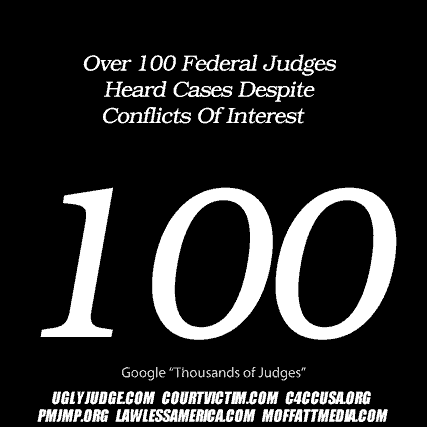Nearly 700 federal court cases from 2010 to 2018 were heard by 131 judges who had financial ties to a company that was part of the case, the Wall Street Journal reported, and in two-thirds of those cases they ruled in favor of the company.
KEY FACTS
Some 131 federal judges heard 685 cases in which they or family members held stock in a company involved in the case, the Journal reported Tuesday.
After being contacted by the Journal, 56 of the 131 judges had their staff begin to tell people in 329 lawsuits that the judge should have recused themselves.
In 21 cases, a judge or family held more than $50,000 in stock of a company involved in the litigation, while in 173 cases the holdings were higher than $15,000.
Rodney Gilstrap, the chief federal judge for the Eastern District of Texas, led his peers with 138 cases in which he had a conflict of interest.
New judges could be assigned to those cases—potentially changing the ruling—and some people who lost cases have already asked for that, the Journal reported.
Key Quote
“If you are a federal judge, you should not be holding individual stocks,” said Andrew O’Connor, whose suit against Comcast was sent to a state court—a development favored by the company—by Judge Lewis Babcock, of the U.S. District Court of Colorado. At the time, Babcock or his family owned at least $15,001 in Comcast stock and may have owned as much as $50,000. For his part, Babcock said “I dropped the ball.” His office did not have an adequate process for checking for conflicts of interest, he said.
Chief Critic
The report “raises a more systemic problem of judges chronically neglecting their duty to disqualify in such cases,” Charles Geyh, an Indiana University law professor, told the Journal.
Contra
The Administrative Office of the U.S. Courts—which carries out the policies of the court system’s governing body, the Judicial Conference—told the Journal that its findings were “troubling” and that the office “is carefully reviewing the matter.” But in a statement to Forbes, the office added that the cases in the story are “less than three one-hundredths of 1 percent of the 2.5 million civil cases filed over the period, and reflects inadvertent mistakes, flaws in software, and simple human error.” The statement said the office is “looking for ways to improve” the courts’ safeguards against conflicts of interest.
Big Number
61. That’s the number of cases during which a judge or family member had traded a company’s stocks while a case was ongoing.
Key Background
It has been illegal since 1974 for federal judges to hear cases where they have legal or financial interest in a company involved, but it is hard, the Journal reported, to get ahold of the disclosures, which are not available online. Some judges told Journal reporters that the error was their staff’s fault. Some said that they missed the need to recuse themselves because software meant to detect and match court documents for potential conflicts of interest had been thrown off by a misspelling or slightly different name. Others said the stock trades lost money, and some said that they had only briefly been connected to a case. Judges are required to recuse themselves regardless of how deeply involved they are in a case, according to the Judicial Conference.




